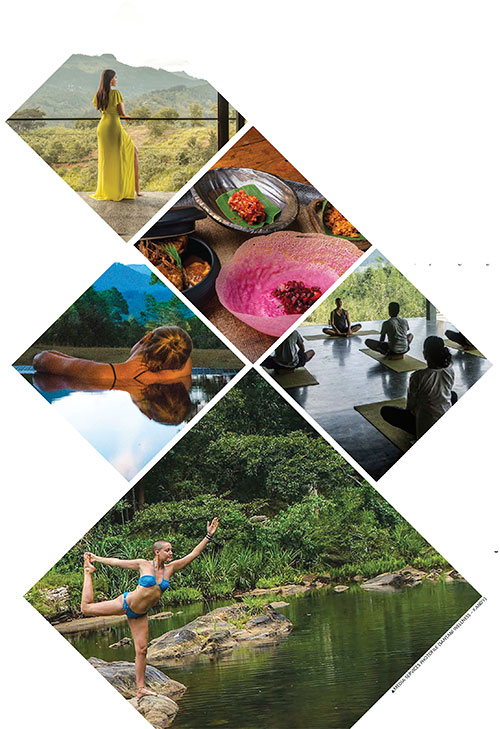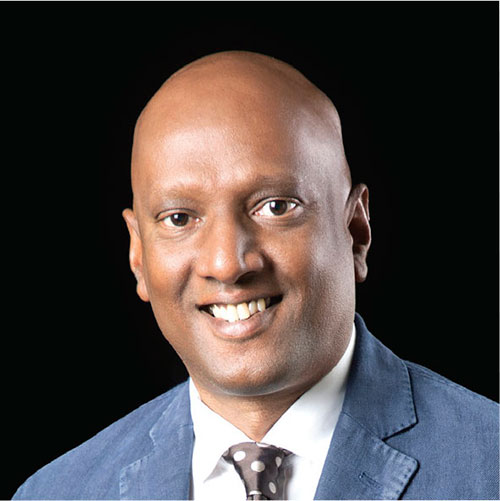ANCIENT HEALING SECRETS
Integrating local expertise and heritage into the wellness experience

Wellness tourism in Sri Lanka is flourishing, leveraging the island’s natural beauty, rich healing traditions and global focus on holistic wellbeing. According to Vickum Nawagamuwage, the sector has undergone a significant transformation in recent years.
“The pandemic shifted global priorities towards health, sustainability and purpose driven travel, placing Sri Lanka in an advantageous position,” he explains, adding: “Travellers today are not just seeking relaxation but experiences that heal the root cause of stress, imbalance and burnout.”
Sri Lanka’s wellness tourism stands out by integrating authentic Ayurvedic practices, mindfulness techniques and eco conscious hospitality. However, Nawagamuwage emphasises that to reach its full potential, the sector requires investment in infrastructure, training and global marketing efforts.
The evolution of wellness tourism in Sri Lanka reflects a growing sophistication in blending ancient wisdom with modern wellness practices.
“Historically, wellness in Sri Lanka was synonymous with Ayurveda; but today, it has expanded to include holistic programmes that integrate yoga, meditation, sustainable dining and psychological wellbeing,” Nawagamuwage notes.
For international travellers, Sri Lanka offers immersive purpose driven retreats, which are designed to address deep-seated physical and emotional imbalances. Meanwhile, local travellers are drawn to wellness programmes that serve as sanctuaries from the stresses of urban life.
“Santani’s approach exemplifies this evolution, combining the timeless wisdom of Sri Lankan healing traditions with global wellness standards to create experiences that are restorative and transformational,” he adds.

Authenticity is at the heart of Sri Lanka’s wellness tourism. “Unlike other destinations, wellness in Sri Lanka goes beyond surface level relaxation to heal the root cause of stress and imbalance,” Nawagamuwage explains.
Bespoke Ayurvedic therapies are combined with mindful practices like forest bathing in mountain landscapes, creating a harmonious healing environment.
And as Nawagamuwage observes, another unique aspect is culinary wellness: “Organic personalised fine dining meals rooted in Ayurvedic principles play a vital role in holistic healing.”
He elaborates: “At Santani, guests experience curated meals that go beyond the traditional Ayurvedic menus. Original Ayurvedic menus were designed over 3,000 years ago with limited ingredients and no supply chains. It does not make any sense to provide the same today, when we have access to anything from anywhere in the world. Blindly following scriptures or traditions is not our way.”
Ayurveda and meditation form the backbone of Sri Lanka’s wellness tourism sector, offering healing that addresses the root causes of both physical and emotional distress. “Ayurveda’s science of balance and preventive care aligns seamlessly with modern wellness goals, providing highly personalised treatments such as Panchakarma detoxes and herbal therapies,” Nawagamuwage explains.
Meditation, which is deeply embedded in Sri Lanka’s Buddhist heritage, offers a path to mental clarity and emotional resilience. “Together, these practices create a holistic approach that doesn’t merely treat symptoms but fosters long-term wellbeing,” he says.
In Sri Lanka, wellness tourism attracts affluent international travellers primarily from Europe, North America and the Middle East, with a growing interest from India and China. “These travellers are often high net worth individuals or professionals seeking immersive experiences that heal the root causes of stress, fatigue and health concerns,” says Nawagamuwage.
Here at home, growing numbers of urban professionals are looking for short-term wellness escapes. “We are seeing more younger demographics interested in ancient wisdom,” he reveals. Sri Lanka’s ability to offer both luxury and community oriented wellness experiences attracts a broad yet discerning audience.
One of the most significant impacts of wellness tourism is its role in supporting local communities. Nawagamuwage asserts that “wellness tourism in Sri Lanka is a lifeline for local communities, providing economic empowerment while preserving and promoting cultural traditions.”
At Santani, the organic farm supplies fresh produce for wellness cuisine while also supporting sustainable farming practices and local farmers. “This ensures that the farm-to-table philosophy resonates deeply with both guests and the community, fostering an ecosystem of mutual benefit and authenticity,” he explains.
Beyond agriculture, wellness tourism extends its impact into cultural preservation. “A shining example is the Samula Heritage Festival, which highlights Sri Lanka’s artistic traditions while integrating them into the wellness experience,” Nawagamuwage notes.
Santani’s Gurukula Excursion with the Amunugama Gurukula introduces guests to Sri Lanka’s traditional dance rituals, he reveals: “These dance traditions, often overlooked, are what the West might recognise as body conditioning by focussing on precise rhythmic movements that align body, mind and energy, offering profound physical and psychological benefits.”
By bridging traditional practices with contemporary wellness concepts, such initiatives educate global audiences while creating sustainable livelihoods for practitioners. “This helps ensure that these ancient traditions are passed down to future generations while also empowering the local Gurukula community through recognition and financial support,” Nawagamuwage states.
Sri Lanka’s wellness tourism sector has the potential to heal individuals, communities and cultural legacies. “By integrating local expertise and heritage into the wellness experience, we not only enhance the authenticity of our offerings but also ensure that communities thrive – economically, culturally and spiritually,” Nawagamuwage concludes.
